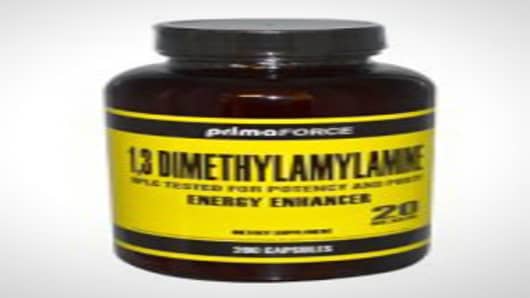In a wake of a warning lettersent to them by the FDA, some companies whose pre-workout or weight loss products include the ingredient DMAA, are starting to move on with life without it.
A company MuscleMeds, which produces the popular pre-workout supplement Code Red, deleted the product from its Web site and a person answering phones was telling consumers this morning that the product was being reformulated. Company executives did not return CNBC's calls seeking comment. (Clarification: A lawyer representing MuscleMeds contacted CNBC after publication of this article and said that the company is not reformulating Code Red. He said the company last shipped the product seven months ago).
A Web page for Fahrenheit Nutrition, another one of the 10 companies that received the FDA letter, reflected that its Lean EFX product no longer had DMAA on the nutritional label. A man answering the phone at the number given on the company’s Web site said he couldn’t comment.
After CNBC’s report on Tuesday, Amazon.com stopped the direct sale of DMAA products on its Web site. It still allows third party vendors to do so. GNC told CNBC it will continue to sell products like OxyElite Pro and Jack3d with DMAA in it after being pleased with its safety finding.
But for GNC, and other vendors selling DMAA products, the issue raised by the FDA comes down to whether the pre-workout ingredient is a dietary supplement or not.
In the letters written to the companies, the FDA stated it didn’t have the evidence that DMAA deserved to be classified as a dietary supplement. The companies are now pressed with coming up with the data that shows otherwise. At least one company, USP Labs, had said that DMAA was a dietary supplement because it was found in the geranium plant. Recent multiple published studies dispute that fact.
If the companies fail to make their case that DMAA is in fact the derivative of the geranium plant, the FDA can halt sales or seize products. Since DMAA wasn’t previously approved as a new dietary supplement, companies can either file paperwork with the FDA to get approval or, if it has no grounds as a dietary supplement, the companies can file to get approval for DMAA as a drug, which is a much more stringent process.
Health Canada, the FDA equivalent in Canada, already banned DMAA in July of last year after finding it was not in fact a dietary supplement and instead was a drug that needed further approval.




